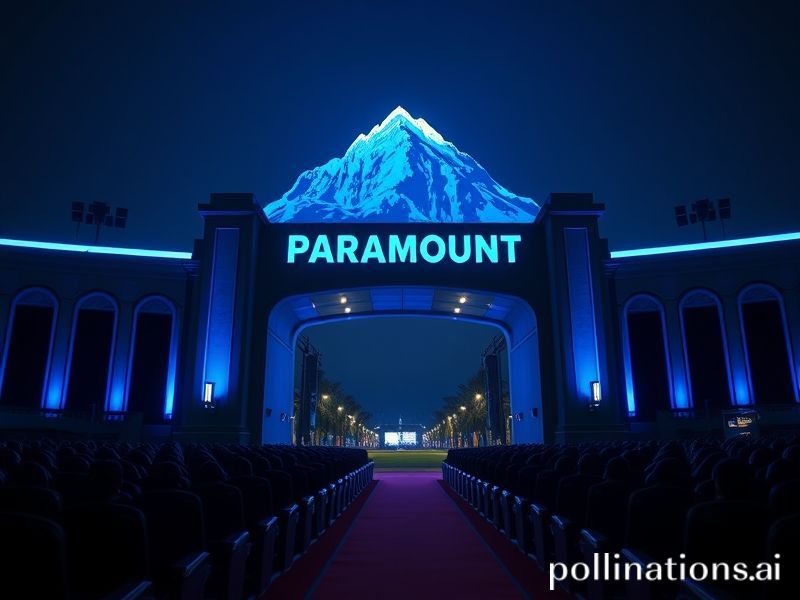Paramount Plus Invades the Globe: How Streaming Became the Soft Power of the 21st Century
Paramount Plus and the Great Streaming Crusade: A Elegy for National Sovereignty, One Binge at a Time
PARIS—Somewhere between the croissants and the existential dread, the French have discovered that Star Trek now beams directly into their living rooms in 4K HDR, courtesy of an American conglomerate that also owns Paw Patrol. Paramount Plus, the latest digital crusader to plant its pixelated flag on foreign soil, has quietly completed its world tour: Latin America first (because nothing says “late-stage capitalism” like selling SpongeBob to children whose governments can’t reliably provide potable water), followed by the Nordics (where winter darkness makes any glowing rectangle feel like a rescue flare), and finally Europe, where regulators still pretend that 30% local content quotas will somehow preserve national identity against a tsunami of Yellowstone spin-offs.
The rollout is textbook imperialism, Silicon-Valley remix. No gunboats, just fiber-optic cables. No missionaries, just Frasier reboots. On the surface, it’s merely another streaming service—$6 a month to watch 1883 and a back catalog that includes every frame of MTV’s 1990s descent into mediocrity. Peel back the shrink-wrap, though, and you find a geopolitical funhouse mirror: nations negotiating their cultural futures over whether the Halo series gets subtitles or dubbing, while their own filmmakers queue for grants that wouldn’t cover the CGI budget for a single Kelpien tear.
Consider South Korea, where Paramount Plus arrived like a polite invader bearing gifts: exclusive K-dramas co-financed to meet the quota, plus the NFL—because nothing satiates a nation already addicted to esports like 11 minutes of actual play stretched across three hours of commercials. Local critics call it “cultural synergy.” Skeptics call it “soft colonization with free trials.” The government, distracted by actual missiles from the north, simply shrugs and counts the export revenue.
Meanwhile, in India, the service piggybacks on Viacom18’s existing bouquet of 700 channels nobody knew they had, bundling Champions League football with iCarly reruns in a package so bewildering it could only be engineered by consultants who’ve never met a real human consumer. The price—₹299 a month—undercuts Netflix by just enough to make middle-class urbanites feel clever, yet still costs more than a day’s wages for the average rural laborer. Somewhere in an air-conditioned Mumbai boardroom, a PowerPoint slide proudly labels this “democratizing access.” The gods of satire weep into their chai.
The broader significance? Every nation is now a programming executive, bargaining away prime-time slots for the promise of jobs that mostly involve moderating comment sections about Star Trek canon. Cultural ministers who once defended tariffs on Hollywood blockbusters now haggle over marketing budgets for Paw Patrol: The Mighty Movie like medieval princes negotiating dowries. The viewer, naturally, is told this is choice—an illusion maintained by autoplay algorithms calibrated to the attention span of a caffeinated fruit fly.
And yet, the human animal adapts. In Buenos Aires, grandmothers binge The Good Fight while inflation devours their pensions. In Stockholm, teenagers stream Beavis and Butt-Head reruns ironically, unaware they’re the same age as their parents when the originals aired—proof that history doesn’t repeat itself, it just gets remastered. Even in Ukraine, where rolling blackouts slice through winter nights, generators hum just long enough to power one more episode of Halo before the shelling resumes. Entertainment, after all, is the last luxury that fits in a go-bag.
The long game is obvious: a single planetary feed, subdivided by language tracks and credit-card zip codes, where every nation’s stories are flattened into one endless scroll of branded content. Resistance is futile, but occasionally hilarious—see France’s doomed “Cultural Exception 2.0,” which tried to tax streamers to fund auteur cinema, only to subsidize yet another sequel about depressed winemakers staring at the Rhône.
Eventually, the servers will outlast the states that host them, humming in server farms cooled by Arctic rivers while archaeologists sift through our hard drives, mistaking Paw Patrol for a fertility cult. Until then, enjoy your free trial. The first month is on Paramount; the existential bill arrives later.







